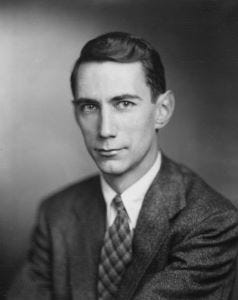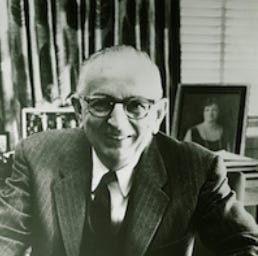Wiener & Shannon: Toward a Politics of Information (III)
Wiener correctly foresaw information technologies increasing exponentially, thus too the quantity of information. Along with this growth in the quantity of information, just as importantly grew the quantity of “noise,” the other essential component of information theory – Uncertainty, Weaver's information partner. In his introduction to Shannon, Weaver provides a simple definition of noise as, “In the process of being transmitted, it is unfortunately characteristic that certain things are added to the signal which were not intended by the information source.” Now it gets a little tricky here understanding the use of statistical math as the basis of information theory, especially confusing in regards to the many ways we traditionally conceive and experience the daily workings of our everyday world.
Weaver writes,
“How does noise affect information? Information is, we must steadily remember (in Shannon's theory), a measure of one's freedom of choice in selecting a message. The greater this freedom of choice, and hence the greater the information, the greater is the uncertainty that the message actually selected is some particular one. Thus greater freedom of choice, greater uncertainty, greater information go hand in hand.”
Weaver helpfully adds, “Uncertainty which arises by virtue of freedom of choice on the part of the sender is desirable uncertainty. Uncertainty which arises because of errors or because of the influence of noise is undesirable uncertainty.”
In regards to how we traditionally define politics, the rapid rise of internet and resulting explosion of information has created massive political noise, straining and increasingly undermining established democratic structures, giving ever greater power to “the Lords of Things as They Are.” Without an ability to complexly interact, that is to democratically choose, society's information tsunami creates ever greater uncertainty, an undesirable uncertainty with political messages become ever greater noise.
This political noise is comprised of two separate though correlated parts. First is the inability to correctly interpret, to choose and act on information, what Weaver defines as Levels B and C of communication. Secondly, with the shear quantity of information “error and confusion arise and fidelity decreases, when, no matter how good the coding, one tries to crowd too much over a channel. Here again a general theory at all levels will surely have to take into account not only the capacity of the channel but also (even the words are right!) the capacity of the audience. If one tries to overcrowd the capacity of the audience, it is probably true, by direct analogy, that you do not, so to speak, fill the audience up and then waste only the remainder by spilling. More likely, and again by direct analogy, if you overcrowd the capacity of the audience you force a general and inescapable error and confusion.” (Weaver)
Industrialization and the rise of broadcast media produced a massive rise in the quantity of information. Over the last century, in response to this communication problem, as the quantity of information grew and political power became more centralized, statistical analysis became prominent as an attempt to deal with the information onslaught.
However, Wiener warned this statistical analysis would prove inadequate, that “the main quantities affecting society are not only statistical, but the runs of statistics on which they are based are excessively short. For a good statistic of society, we need long runs under essentially constant conditions.” Which we didn't have then and don't have now, most especially in this era of incessant technological churning, where the society of today differs vastly from yesterday and even more so from tomorrow. He concludes, “Thus the human sciences are very poor testing-grounds for a new mathematical technique.”
But that certainly didn't stop the Lords of Things as They Are, in fact they desperately searched their statistics with ever greater intensity looking for answers that aren't there. Our academic, government, and corporate institutions spew unending statistics in defense of failing policies. Wiener concludes, “There is much which we must leave, whether we like it or not, to the un-'scientific,' narrative method of the professional historian.” Unfortunately, the one thing entirely lost to our technology saturated, information inundated society is all historical understanding. History still offers a foundation to help navigate our technological future. I speak here not merely of human history, but the natural history from which Homo sapiens were conceived.
The great question is how we restructure society, our processes and institutions, to better transmit, measure, and value information. Shannon stated, “Frequently the messages have meaning; that is they refer to or are correlated according to some system with certain physical or conceptual entities. These semantic aspects of communication are irrelevant to the engineering problem.” Yet, in the introduction, where Weaver lays out the three components of communication theory, he correctly notes that the architecture does indeed at times impact the meaning, the semantics. The system's architecture, its engineering, in part “overlaps” the meaning, “more than one could possible naively suspect.”
This understanding is politically imperative, simply, the democratic processing of information is only possible with a democratic architecture, a democratic engineering of information systems. In the simple linear communication system schematic at the top of this piece, Weaver imagines “another box labeled 'Semantic Receiver' interposed between the engineering receiver (which changes signals to messages) and the destination.” Politically, this should be the main job of associations, organizations of people producing, editing, and interpreting, providing meaning and context to information. Politically, there is a need to create distributed networked systems with innumerable channels connecting multitudes of associations of individuals choosing to act on any given information, simultaneously providing feedback across the networks.
Again going back to the inherent statistical and probabilistic nature of information theory, communication has a direct definitional relation to entropy. A message can be pulled out of a larger ocean of “noise” simply by its order in relation to the greater disorder it is ensconced. Weaver writes,
“In doing this, we have made of communication engineering design a statistical science, a branch of statistical mechanics. ...The notion of the amount of information attaches itself very naturally to a classical notion in statistical mechanics: that of entropy. Just as the amount of information in a system is a measure of its degree of organization, so the entropy of a system is a measure of its degree of disorganization; and the one is simply the negative of the other.”
Just as with quantum physics and Darwinian evolution, information's meaning is partly subjective, relative, derived in relation to its greater environment. This idea of subjectivity is in direct opposition to Plato's notion of forms, that is of single objective meaning. This idea of objectivity goes even further back than the Greeks, inherent in the idea of centralized government, of concentrated control, and immutable laws. Of course it was never true these systems were objective, just the opposite. Meaning was first and foremost provided in defense of the centralized system of power. Information was controlled, edited, and communicated to insure the position and continuation of established power, objectivity was a means of power.
From an information system perspective, centralization is failing, statistics as means of governing are insufficient and imprecise measures leading to false values. Social systems are not linear systems, they are nonlinear, the information input in no way equals what's received, and just as importantly the seeming homogeneity of any given message can be interpreted in countless different ways.
With our contemporary centralized powers, the notion of information objectivity still strives, especially in the American National Security State and our leviathan corporations. It is accompanied and justified by, as with all despotic regimes of the past, a growing crippling dependence on secrecy haunting both sectors. At the dawning of the National Security State, Wiener summed up the problem in a 1950 talk as a “creeping paralysis of secrecy which is engulfing our government, secrecy simply means we are unable to face situations as they are, the people who have to control situations are in no position to handle them.”
People in control of situations in no position to handle them. What better can describe America's dysfunction?
Democratically, we must embrace the flood of information, openness of communication, and the resulting subjectivity. Weaver points to the thought of the great physicist and astronomer Arthur Eddington,
“Suppose that we were asked to arrange the following in two categories - distance, mass, electric force, entropy, beauty, melody. I think there are the strongest grounds for placing entropy alongside beauty and melody, and not with the first three. Entropy is only found when the parts are viewed in association, and it is by viewing or hearing the parts in association that beauty and melody are discerned. All three are features of arrangement.”
“Viewed in association,” meaning provided relative to “arrangement.” Again at the heart of many of our political problems is organizational ineptitude, a problem completely ignored by almost all political analysis.
We require understanding of the fundamental necessity of information creation, editing, and communication, as inherently political processes. Doing so requires the creation of innumerable associations, whether independent or essential components of every societal entity, an understanding of the necessity of “semantic receivers.” As semantic receivers, such associations are advocates of subjective interpretations of information allowing choice in how it may be implemented. It should be noted regarding the recent popularity of “Artificial Intelligence,” in the end, any computer's results will be subjective arising both from the information inputted and the very physical mechanisms of the computer itself. Centralized compute power is no more objective than an old sultan's palace.
Creating a political system that is information rich, distributedly networked, constantly interacting, and democratically subjective, requires much more organic processes. Systems more in common with biological complexity than the mechanical power of industrialism. After two centuries of industrialism, biology must reassert itself with an understanding all life flourishes in relation to its greater environment. We need to be reactionary in reasserting locality, creating associations that first and foremost seek to take advantage of their local geography, climate, and diversity of ecological systems, simultaneously interacting and creating the greater whole, as opposed to being homogenized and controlled from above.
We can structure society and our interactions with the greater environment by embracing the thing which makes us most human, sapiens. We can move from industrial values where society is designed by gross energy usage and instead use information to become more energy sophisticated, a return to being more defined by the greater environment, not simply through its manipulation using ever greater force.
From a biological, life systems perspective, it also means overturning long established ideas behind governance, most especially the idea that laws are meant for the ages. We need to look at laws as communication changing through feedback, interpretation varies as interaction provides definition, meaning evolves. We, every individual, are the equal components of an intricately complex information system, the body politic. It is a system that must literally come alive through continuous participation, our cultural, economic, and political interconnections providing democratic homeostasis.




